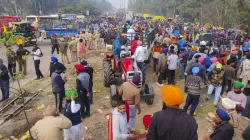Farmers' protest: Punjab got 50% less diesel, 20% less gas due to agitation
Farmers are demanding to enact a law guaranteeing a minimum support price (MSP) for all crops, as recommended by the Swaminathan Commission report.

Farmers' protest: Amid the ongoing farmers' protest causing chaotic scenes at the Punjab-Haryana border, fuel supply to Punjab was disrupted. Government sources told news agency ANI that there was a fifty per cent reduction in diesel dispatches and a twenty per cent reduction in gas dispatches to Punjab.
Farmers protest
Nearly two years later, farmers have resumed their agitation, calling for the implementation of a law ensuring a minimum support price (MSP) for crops based on the report of the M S Swaminathan Commission. Following an unsuccessful meeting with three Union ministers in Chandigarh on Monday (February 12) evening, the farmers are attempting to march towards Delhi.
As farmers in large numbers marched towards the national capital on Tuesday, the police fired tear gas on the protestors at the Punjab-Haryana Shambhu Border. The police also deployed concrete slabs, iron nails, barricades, barbed wires, and police and paramilitary personnel at Kurukshetra in Haryana in view of the 'Delhi Chalo' march by the farmers.
12 demands of farmers
The farmers have put forth 12 demands before the central government for which they're marching to Delhi. The protest this time has been called by the Sanyukt Kisan Morcha and Punjab Kisan Mazdoor Sangharsh Committee, led by farmer union leaders Jagjeet Singh Dallewal and Sarwan Singh Pandher.
The protesting farmers claim that the government assured them of improved crop prices, leading to the conclusion of their 2021 protest. They are now demanding the enactment of a law that ensures a minimum support price (MSP) for all crops, in accordance with the recommendations of the Swaminathan Commission report.
In addition to MSP assurance, the farmers are calling for a comprehensive debt waiver programme and the establishment of a pension scheme for both farmers and farm labourers. Furthermore, they are vehemently opposing the Electricity Amendment Bill 2020 and are urging for the reinstatement of the Land Acquisition Act of 2013. This reinstatement would entail provisions ensuring farmers' consent and compensation set at four times the collector rate.
Further, they are demanding to punish those involved in the Lakhimpur Kheri killings.
What is Minimum Support Price (MSP)?
The Minimum Support Price (MSP) is a form of market intervention by the Government of India to shield agricultural producers from significant drops in farm prices. Announced at the onset of the sowing season for specific crops, these minimum support prices are determined based on recommendations from the Commission for Agricultural Costs and Prices (CACP). The primary aim of the MSP is to ensure that farmers are protected against steep declines in prices during years of bumper production.
Through the MSP mechanism, the government aims to achieve several key objectives. Firstly, it seeks to shield farmers from the adverse effects of distress sales, thereby providing them with a safety net against market volatility. Additionally, the procurement of food grains at MSP rates facilitates the accumulation of stocks for public distribution, thereby contributing to food security initiatives.
In instances where the market price for a particular commodity falls below the announced minimum price, often due to excess production and oversupply, government agencies step in to purchase the entire quantity offered by farmers at the established minimum price. This intervention serves to stabilize prices and mitigate the adverse impacts of market fluctuations on farmers' incomes.
Also Read: Delhi's Red Fort closed for visitors, security heightened in view of farmers protest